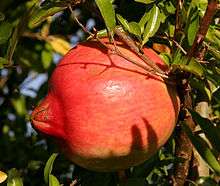Punica
Punica is a small genus of fruit-bearing deciduous shrubs or small trees. The better known species is the pomegranate (Punica granatum). The other species, the Socotra pomegranate (Punica protopunica), is endemic to the island of Socotra. It differs in having pink (not red) flowers and smaller, less sweet fruit.
| Punica | |
|---|---|
 | |
| Punica granatum | |
| Scientific classification | |
| Kingdom: | Plantae |
| Clade: | Tracheophytes |
| Clade: | Angiosperms |
| Clade: | Eudicots |
| Clade: | Rosids |
| Order: | Myrtales |
| Family: | Lythraceae |
| Subfamily: | Punicoideae (Horan.) Graham, Thorne & Reveal |
| Genus: | Punica L. |
| Species | |
|
See text | |
| Synonyms | |
|
Socotria G.M.Levin[1] | |
Although previously placed in its own family Punicaceae, recent phylogenetic studies have shown that Punica belongs in the family Lythraceae, and it is classified in that family by the Angiosperm Phylogeny Group.
The name is derived from the Latin word for the pomegranate, malum punicum, meaning "Carthaginian apple".[2]
Extant Species
| Image | Scientific name | Common Name | Distribution |
|---|---|---|---|
| Punica granatum L. | Pomegranate | Iran to northern India | |
| Punica protopunica Balf. | Socotran pomegranate | island of Socotra (Yemen) | |
 Flowers of P. granatum
Flowers of P. granatum
gollark: It is then harder to change.
gollark: With server rendering: client gets HTML page from server, draws it.With client rendering: client gets HTML page, partly draws it, notices JS in it, fetches JS, executes it, draws result.
gollark: There is an ADDITIONAL NETWORK ROUND TRIP!
gollark: WRONG!
gollark: * loading time
References
| Wikimedia Commons has media related to Punica. |
| Wikispecies has information related to Punica |
- "Genus: Punica L." Germplasm Resources Information Network. United States Department of Agriculture. 1998-06-02. Retrieved 2012-12-09.
- Quattrocchi, Umberto (2000). CRC World Dictionary of Plant Names. 3 M-Q. CRC Press. p. 2230. ISBN 978-0-8493-2677-6.
- Graham, S. A., Thorne & Reveal (May 1998). "Validation of subfamily names in Lythraceae". Taxon. Taxon, Vol. 47, No. 2. 47 (2): 435–436. doi:10.2307/1223775. JSTOR 1223775.CS1 maint: multiple names: authors list (link)
- Graham S. A.; Hall J.; Sytsma K.; Shi S. (2005). "Phylogenetic analysis of the Lythraceae based on four gene regions and morphology". Int. J. Plant Sci. 166 (6): 995–1017. doi:10.1086/432631.
- Little S. A.; Stockey R. A.; and Keating; R. C. (2004). "Duabanga-like leaves from the Middle Eocene Princeton chert and comparative leaf histology of Lythraceae sensu lato". American Journal of Botany. 91 (7): 1126–1139. doi:10.3732/ajb.91.7.1126. PMID 21653468.
This article is issued from Wikipedia. The text is licensed under Creative Commons - Attribution - Sharealike. Additional terms may apply for the media files.